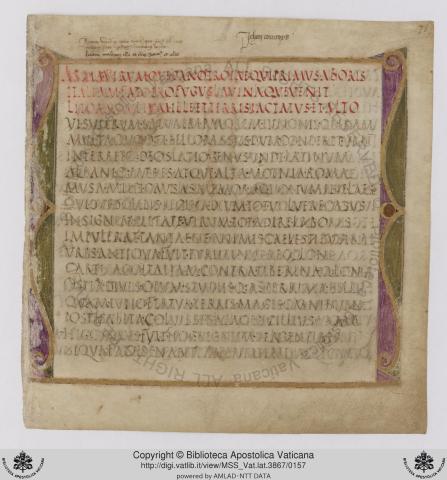Arma virumque canō, Trōiae quī prīmus ab ōrīs
Ītaliam fātō profugus Lāvīniaque vēnit
lītora, multum ille et terrīs iactātus et altō
vī superum, saevae memorem Iūnōnis ob īram,
multa quoque et bellō passus, dum conderet urbem5
īnferretque deōs Latiō; genus unde Latīnum
Albānīque patrēs atque altae moenia Rōmae.
Mūsa, mihī causās memorā, quō nūmine laesō
quidve dolēns rēgīna deum tot volvere cāsūs
īnsignem pietāte virum, tot adīre labōrēs10
impulerit. Tantaene animīs caelestibus īrae?
notes
As is expected in the genre of epic, the first few lines of the poem reveal the outlines of the plot and its significance. And so we know immediately that this is a story about war, arma, and that it will have one main character, virumque; we know that the author is going to have a presence ... [full essay]
1: arma virumque: the first word, indicating war as the subject matter of the poem, challenges comparison with the Iliad; the second challenges comparison with the Odyssey. Throughout the Aeneid Vergil sets his Roman theme in tension with the heroic world of Homer; Aeneas has to leave the one world and enter the other (Williams). primus: “first,” not here in the sense of “the first who,” but “at the first,” “in the beginning” (Frieze). The meaning is not that Aeneas was the first of a series of Trojans who settled in Italy, but merely that he marks the first beginning of the Roman race (Bennett).
2: Italiam: acc. of the limit of motion. In prose a preposition (ad or in) would be required (F-B) (AG 428g). Note that the initial I of Italia is here used as long. In prose, as Quintilian expressly assures us, this I is short. But adherence to this quantity would have made the word impossible to use in the dactylic hexameter (Bennett). fato: belongs to both profugus and venit (F-B). Lavinia: i.e., the western coast of Italy, where is the town of Lavinium, assumed to be named for Lavinia, the Italian bride of Aeneas (G-K). Trisyllabic, by synizesis (Austin). Lavinia is sometimes scanned as four syllables (6.764, 7.72), sometimes as three, the i being pronounced as y (see 6.33 quīn prōtinus omnia) (AG 603c, N). Italiam...Lavinia: form a good illustration of one of Vergil’s favorite devices—transition from the general to the specific; the gradual narrowing down of the thing referred to (Carter).
3: multum: Here an adverb, limiting iactatus (Bennett). ille: the pronoun is in a kind of apposition with qui (G-K). terris, alto: ablatives of the place where, without a preposition, which is poetic (F-B) (AG 429.4). alto: altum is regularly used as a noun ( = altum mare) (Comstock).
4: superum: for superorum, “of the gods above”; equivalent here to “divine,” referring to vi, and meaning especially Juno (Frieze) (AG 49d). memorem: transferred epithet: it was Juno that never forgot (Knapp); “relentless,” that forgets not (Frieze).
5: multa quoque et bello passus: “and having suffered much besides in war” (Bennett). dum conderet: Dum takes the subjunctive here because purpose or intention is denoted (Wetherell) (AG 553).
6: deos: i.e., the Penates or “household gods,” on whose safety the fortunes of the “house of Troy” depended: a city regarded as a great family had its public Penates as each family had its private ones (Page). Latio: dative with a verb of motion, which is poetic (AG 428g); in Latium would be the normal prose construction. inferretque deos Latio: the shade of Hector had entrusted the Penates of Troy to Aeneas, and it was a major feature of his mission that he had to establish a continuity of religious worship between Troy and Rome (Williams). unde: “from which event,” supply ortum est, “arose” (Robertson). The Latin race, Alban Senate, and Rome, refer to the three phases in the national history when the seat of power was respectively Lavinium, Alba Longa, Rome (Walpole). unde: equivalent to qua ex re; from the fact that Aeneas suffered and did thus, originated the Latin race, Alba, and Rome (Frieze). = e quo, and referring back to virum, the main subject of thought throughout the paragraph (F-B). Altae: Rome, like many cities of Italy, was built on elevated ground, for greater security from attack. Perhaps, however, the reference is to its lofty walls (Frieze).
8–11: quo..impulerit: an indirect question in apposition to causas (Storr).
8: Musa: Calliope, the muse of epic poetry. The muses were daughters of Jupiter and Mnemosyne. They were nine in number. Clio, who presided over history; Calliope over heroic song, Melpomene over tragedy, Thalia over comedy, Erato over love-song and hymns, Euterpe over lyric poetry, Terpsichore over the harp and dances, Polyhymnia over rhetoric and theatrical gestures, and Uranie over astronomy (Robertson). Greek and Latin poets often profess to be merely the mouthpieces of the Muses (Knapp). mihi: the final i of mihi (regularly short) is here long. This is not an arbitrary license, but is a reminiscence of the original quantity of the final syllable (Bennett). memora: Memora is appropriate, as the Muses were connected with memory (Conington). quo numine laeso: an abl. absol. clause, quo being the interrog. adj. The phrase may be taken in two ways: (1) the simpler, “what divine purpose having been thwarted”; (2) “what divinity of hers having been insulted,” i.e., “her divinity having been insulted in what respect” (C-R). As a direct question it would be quod numen laesum est? (Williams). numen is the goddess’s will, wish, or purpose (F-B).
9–10: quid: “on what account”; the interrogatives really belong only with the participles, but are made to introduce the whole clause ending with impulerit. More correct but less vigorous would be quod numen laesum sit quidve doluerit ut...impulerit (Knapp).
9: Quidve dolens: “Or grieved at what” (F-B). Many verbs of feeling, apparently intransitive, as dolēre, ridēre, take acc. in Latin (Wetherell) (AG 388a, 390b). deum = deorum (F-B) (AG 49d). volvere casus: The idea expressed in volvere is that of a cycle of disasters which have to be passed through in due order. The metaphor is probably derived from the movements of the heavenly bodies and the seasons (Page). In poetry and late prose, after the Greek idiom, verbs of striving, commanding, and advising are used with the infinitive. The regular prose construction would be ut volveret (Walpole) (AG 563).
10: insignem pietate virum: Pietas, from which we derive both “piety” and “pity,” has many shades of meaning. In men it is a dutiful regard and affection for those who have a natural claim upon them—(1) for the gods, and especially those of their own home or country; (2) for parents, relatives and fatherland—parentes, propinqui, patria. It is that inward quality which, together with bravery in action, constitutes the leader of men…and the ideal hero (Page). virum: the subject of the infinitives volvere and adire (Carter). labores: involves a comparison with Hercules, who also was a victim of Juno’s persecution (Conway).
11: impulerit: subjunctive of indirect question (F-B) (AG 574). Tantaene...irae: “Is there such wrath in heavenly souls?” Animis is dative of possession with sunt understood (Wetherell) (AG 373). The plurural of abstract nouns often, as here, indicates either the intensity or various manifestations of a feeling (C-R).
vocabulary
Trōia, ae, f.: 1. Troy, the capital of the Troad, 2.625, et al. 2. A city built by Helenus in Epirus, 3.349. 3. A part of the city of Acesta in Sicily, 5.756. 4. The name of an equestrian game of Roman boys, 5.602.
ōra, ae, f.: a margin, border, 12.924; coast, shore, 3.396; region, 2.91; rim, extremity, 10.477; pl., outline, compass, 9.528.
Ītalia, ae (Ī by poetic (epic) license), f.: Italy, 1.2, et al.
profugus, a, um : adj. (profugiō, flee), fleeing forth; fugitive, exiled, 1.2.
Lāvīnius, a, um and Lāvīnus, a, um, adj.: (Lāvīnium), of or belonging to Lavinium, 4.236.
iactō, āvī, ātus, 1, freq. a.: to throw often or much; toss to and fro; toss, freq.; hurl, cast, 2.459; thrust out, 5.376; aim, 5.433; (fig.), throw out words, utter, say, 1.102; of the mind, revolve, meditate, 1.227; sē iactāre, boast, exalt one's self, rejoice, glory, 1.140; prae sē iactāre, to make pretense of, 9.134; p., iactāns, antis, arrogant, assuming, ambitious, 6.815. (iaciō)
altum, ī, n.: the deep; the lofty; the deep sea, the main, the deep, 1.3; the sky, heaven, air, 1.297; from far, far-fetched, remote, 8.395. (altus)
memor, oris: adj. (rel. to mēns and meminī), mindful, remembering, 1.23; heedful, 480; thankful, grateful, 4.539; not forgetting; relentless, 1.4; with nōn or nec, unmindful, regardless, 12.534.
Iūnō, ōnis, f.: Juno, the Sabine and Roman name for the wife and sister of Jupiter, daughter of Saturn, 1.4, et al.; Iūnō īnferna, the Juno of the lower world, Proserpine, 6.138.
Latium, iī, n.: a country of ancient Italy, extending from the left bank of the lower Tiber to Campania, 1.6; (meton.), for Latīnī, the Latins, people of Latium, 10.365, et al. (2. latus; Virgil, 8.323, derives it from lateō)
Latīnus, a, um: adj. (Latium), of Latium; Latin, 1.6, et al.; Latīna, ae, f., a Latin woman, 12.604.
Albānus, a, um: adj. (Alba), pertaining to Alba; Alban, 1.7; subst., Albānī, ōrum, m., the Albans, 5.600.
Rōma, ae, f.: Rome, 1.7, et al.
Mūsa, ae, f.: a muse; one of the nine daughters of Jupiter and Mnemosyne, goddesses who preside over the liberal arts of poetry, music, etc., 1.8, et al.; (meton.), a poem or song.
memorō, āvī, ātus, 1, a.: to call to memory; mention, rehearse, relate, 1.8; say, speak, 3.182; name, 1.327; mention proudly, boast of, 5.392. (memor)
rēgīna, ae, f.: a queen, 1.9; princess, 1.273. (rēx)
volvō, volvī, volūtus, 3, a.: to roll, 1.86; roll along or down, 1.101; roll or cast up, 3.206; toss, hurl, 12.906; roll over, roll in the dust, 12.329; cast, hurl down, 1.116; 9.512; roll, wheel, 1.163; of books, open, unroll, 1.262; of the Fates, fix the circle of events, decree, ordain, dispose, 1.22; 3.376; of the mind, revolve, meditate, reflect upon, 1.305; pass, continue, live through, experience, endure, suffer, 1.9; rotam volvere, to complete a cycle, period; (pass.), volvī, roll over, roll, 10.590; turn or wind about, 7.350; to be shed, to flow, 4.449; roll on, revolve, 1.269.
īnsīgnis, e: beautiful, 3.468; splendid, adorned, 4.134; conspicuous, 6.808; marked, renowned, distinguished, 1.10; illustrious, glorious, 10.450. (in and sīgnum)
impellō, pulī, pulsus, 3, a.: to push, thrust, drive to or upon; push onward, impel, 5.242; push, open, 7.621; smite, 1.82; ply, 4.594; put in motion, urge on, 8.3; shoot, 12.856; move, disturb, 3.449; (w. inf.), lead on, impel, induce, persuade, 2.55; force, compel, 1.11.


